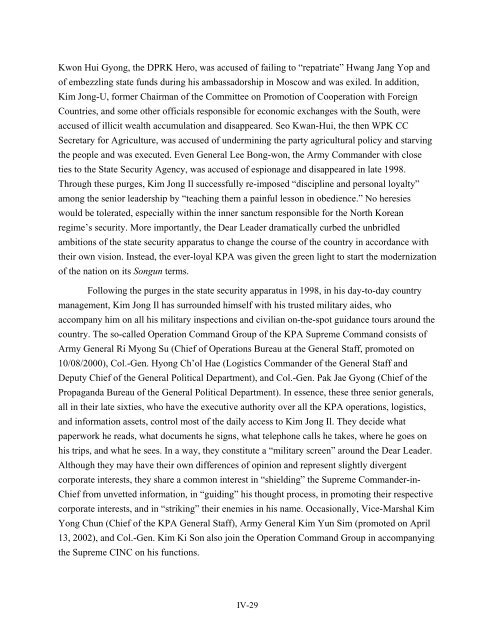North Korean Policy Elites - Defense Technical Information Center
North Korean Policy Elites - Defense Technical Information Center
North Korean Policy Elites - Defense Technical Information Center
You also want an ePaper? Increase the reach of your titles
YUMPU automatically turns print PDFs into web optimized ePapers that Google loves.
Kwon Hui Gyong, the DPRK Hero, was accused of failing to “repatriate” Hwang Jang Yop and<br />
of embezzling state funds during his ambassadorship in Moscow and was exiled. In addition,<br />
Kim Jong-U, former Chairman of the Committee on Promotion of Cooperation with Foreign<br />
Countries, and some other officials responsible for economic exchanges with the South, were<br />
accused of illicit wealth accumulation and disappeared. Seo Kwan-Hui, the then WPK CC<br />
Secretary for Agriculture, was accused of undermining the party agricultural policy and starving<br />
the people and was executed. Even General Lee Bong-won, the Army Commander with close<br />
ties to the State Security Agency, was accused of espionage and disappeared in late 1998.<br />
Through these purges, Kim Jong Il successfully re-imposed “discipline and personal loyalty”<br />
among the senior leadership by “teaching them a painful lesson in obedience.” No heresies<br />
would be tolerated, especially within the inner sanctum responsible for the <strong>North</strong> <strong>Korean</strong><br />
regime’s security. More importantly, the Dear Leader dramatically curbed the unbridled<br />
ambitions of the state security apparatus to change the course of the country in accordance with<br />
their own vision. Instead, the ever-loyal KPA was given the green light to start the modernization<br />
of the nation on its Songun terms.<br />
Following the purges in the state security apparatus in 1998, in his day-to-day country<br />
management, Kim Jong Il has surrounded himself with his trusted military aides, who<br />
accompany him on all his military inspections and civilian on-the-spot guidance tours around the<br />
country. The so-called Operation Command Group of the KPA Supreme Command consists of<br />
Army General Ri Myong Su (Chief of Operations Bureau at the General Staff, promoted on<br />
10/08/2000), Col.-Gen. Hyong Ch’ol Hae (Logistics Commander of the General Staff and<br />
Deputy Chief of the General Political Department), and Col.-Gen. Pak Jae Gyong (Chief of the<br />
Propaganda Bureau of the General Political Department). In essence, these three senior generals,<br />
all in their late sixties, who have the executive authority over all the KPA operations, logistics,<br />
and information assets, control most of the daily access to Kim Jong Il. They decide what<br />
paperwork he reads, what documents he signs, what telephone calls he takes, where he goes on<br />
his trips, and what he sees. In a way, they constitute a “military screen” around the Dear Leader.<br />
Although they may have their own differences of opinion and represent slightly divergent<br />
corporate interests, they share a common interest in “shielding” the Supreme Commander-in-<br />
Chief from unvetted information, in “guiding” his thought process, in promoting their respective<br />
corporate interests, and in “striking” their enemies in his name. Occasionally, Vice-Marshal Kim<br />
Yong Chun (Chief of the KPA General Staff), Army General Kim Yun Sim (promoted on April<br />
13, 2002), and Col.-Gen. Kim Ki Son also join the Operation Command Group in accompanying<br />
the Supreme CINC on his functions.<br />
IV-29













